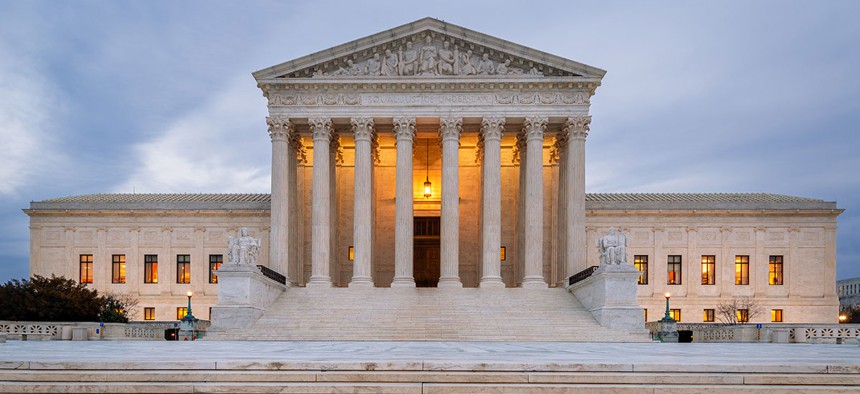Supreme Court Case on State Legislatures Could Have ‘Devastating Consequences’

The United States Supreme Court building. Joe Daniel Price / Getty Images
COMMENTARY | This week the nation’s high court will hear Moore v. Harper, a case examining independent state legislature theory.
This article was first published by Route Fifty partner publication, City & State Pennsylvania.
This week the Supreme Court of the United States is hearing Moore v. Harper, a case with potentially devastating consequences for our democracy. In that case the Court is considering whether to adopt the “independent state legislature” theory to interpret the election clauses of the U.S. Constitution.
The gist of this theory is that since the Constitution states that federal elections for Congress shall be conducted in the manner “prescribed in each State by the legislature thereof” and that presidential electors shall be appointed “in such manner as the legislature thereof may direct,” state legislatures have the sole authority to decide how to conduct those elections and even to determine their results, regardless of state laws and state constitutions specifying roles for the state courts, governors, secretaries of state and county boards of elections.
It would allow a majority of the Pennsylvania General Assembly to cast aside the votes and overrule the will of millions of Pennsylvania citizens in congressional and presidential elections.
There are multiple reasons why the “independent state legislature theory” is not a correct interpretation of the Constitution.
First, the independent state legislature theory is based upon an absurdly literal approach to constitutional interpretation that entirely ignores the purpose and meaning of the Constitution. Literalism can be funny – “I shot an elephant in my pajamas … How the elephant got in my pajamas I’ll never know!” Ignoring context can be dangerous. The sign “No vehicles in the park” is not meant to prohibit ambulances from entering the park in an emergency. Focusing on semantics may also miss the point. The Bible doesn’t tell stories like The Good Samaritan and The Stoning of the Adulteress to describe actual historical events, but to teach values and provide a framework for acting morally.
The purpose of the election clauses is to instruct state legislatures to write election laws for the states – not to abrogate state constitutions and abolish the lawful authority of state courts and every other state official.
Second, the theory ignores four major types of legal arguments: arguments based upon intent, precedent, tradition and policy. It relies on a simplistic reading of brief directions in the Constitution without regard to what the framers meant by those words. It contradicts longstanding judicial precedent. It is in conflict with more than two centuries of experience in conducting elections. And the theory is also at odds with the very purpose of the Constitution, which was to establish a government of the people, by the people, and for the people. No state legislature should be able to subvert the will of the people of that state and the people of the nation in electing a president.
Third, the theory is not only wrong, but wrongful. Former President Donald J. Trump attempted to overturn the presidential election of 2020 by urging state legislatures to appoint slates of electors different from those elected by the people of those states. Now three justices appointed by him are considering making this legal by judicial fiat. Such a decision would overrule the foundations of our democracy.
There is a fourth reason why the independent state legislature theory is wrong. It is utterly incompatible with the well-established doctrine of dual sovereignty – the fact that while the federal government is supreme within the bounds of its enumerated powers, the state governments also have sovereignty to exercise their proper roles. Every American is both a citizen of the United States and a citizen of the state where they reside.
State legislatures are created by state constitutions. These constitutions determine how state laws are passed, when they become effective and how elections shall be managed. Typically, secretaries of state and county election boards are created by state constitutions. Most of these constitutions expressly require that elections be “free,” “free and equal” or “free and open.”
In every state, either state statutes or the state constitution provides that presidential electors are to be elected by popular vote of the people, not appointed by the state legislature. The state legislature is an integral part of the election process but it does not operate independently of the rest of a state’s government.
State legislatures are creatures of state constitutions. While the Constitution of the United States identifies constitutional rights that are the “supreme law of the land,” the federal constitution has no authority to vest powers in state institutions, including legislatures, that conflict with the roles they have in state constitutions.
Contrary to the idea behind the “independent state legislature theory,” no state legislature can ever be “independent” of the very people who elected them and take away their right to participate in “free and open” elections guaranteed by the constitution and laws of their state.
Wilson Huhn is a professor at Duquesne University Thomas R. Kline School of Law. Jonathan Winer is on the Advisory Council of Keep Our Republic, a civic education nonprofit.
NEXT STORY: How One State is Curbing Growth in Health Care Costs





